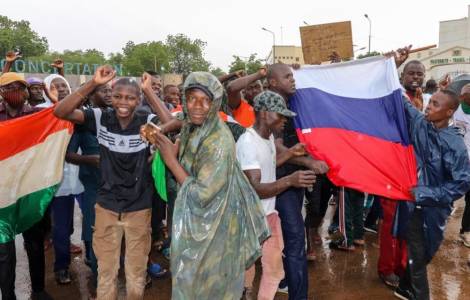AFRICA/NIGER – Nine months after the coup: an analysis
Tuesday, 9 April 2024
by Mauro Armanino
Niamey (Agenzia Fides) – Nine months have passed from the end of July last year to April this year, the period of pregnancy. The military coup was relatively unexpected and was particularly surprising because of the method used. The kidnapping of the incumbent president in the presidential house by the bodyguard who was supposed to protect him from this and other coup attempts. The cyclical rhythm of the coups in Niger highlights the blockages in the implementation of democratic change by political parties and the “unreliability” of the institutions that are supposed to guarantee it. These institutions also include the military, which has played a crucial role in the country’s democratic or non-democratic order since the beginning of the Republic. The politics of transition seem to be built on sand. The country’s tricolor flags, initially carried by taxis, have gradually disappeared. Even the crowds of people in the stadium in the first few days and the protests on the streets have gradually given way to the monotony of everyday life. The reopening of the borders and the lifting of sanctions by the Economic Community of West African States have not brought the relief that the poor population and economic entrepreneurs were waiting for.
After the expulsion of the French military and the discretion of the few remaining foreign civilians, it has now also called on the American military to withdraw. The Italian soldiers remain on site pending future diplomatic and economic considerations. The Alliance of Sahel States (Alliance des États du Sahel, AES), which includes Mali, Burkina Faso and Niger, the countries most affected by terrorism, banditry and profiteering, is intended to be a political-military response to the dramatic situation of insecurity of the population. The number of displaced people in this part of the Sahel is in the millions and thousands of farmers are struggling to survive. The feared famine, which unfortunately has also been “institutionalized” for years, affects a large part of the population. The political decisions associated with the absolutization of the concepts of “national sovereignty” and ‘autarchy’ have consequences and “reactions” on the population that have not always been adequately taken into account. Perhaps the crucial point of the transition of these months lies in the difficulty of finding the core of a political project that shapes the present. In order not to betray the principle of “reality”, it should focus on the “common good”, namely justice for the poor. In order to avoid the past being reproduced in the future, politics and especially democracy were invented. (Agenzia Fides, 9/4/2024)
Share:
Source link : https://www.fides.org/en/news/74884-AFRICA_NIGER_Nine_months_after_the_coup_an_analysis
Author :
Publish date : 2024-04-09 07:00:00
Copyright for syndicated content belongs to the linked Source.
